
The article outlines best practices for business development and consulting, emphasizing the importance of strategic planning, effective communication, and continuous improvement to drive organizational growth. It supports these points by detailing the role of market research, relationship management, and training, as well as the necessity of leveraging technology and adapting to market changes, which collectively enhance performance and competitive advantage.
In the dynamic world of business development, organizations are constantly seeking innovative strategies to foster growth and enhance performance. This multifaceted discipline encompasses everything from market research and relationship management to the formation of strategic partnerships that drive expansion. Coupled with the expertise of consulting, these efforts are vital in navigating complex challenges and seizing new opportunities.
As industries evolve, particularly in competitive regions like APAC and ME, understanding the latest trends and leveraging technology becomes paramount. With a focus on continuous improvement, effective training, and strategic planning, businesses can not only adapt to changing landscapes but also thrive in them, ensuring sustained success in an increasingly competitive marketplace.
Business development and consulting includes a variety of activities and approaches aimed at promoting growth opportunities within an organization. This includes conducting thorough market research, managing relationships, and forming strategic partnerships that can drive expansion. Consulting plays an essential role in this process by providing expert insights that help organizations enhance their performance and tackle complex challenges.
The two functions are inherently connected; effective business development and consulting often rely on consulting expertise to identify customer needs and provide tailored solutions. For example, in the competitive environment of regional infrastructure providers, altering go-to-market and selling approaches is essential to rival cloud giants. Implementing transformative Service-as-a-Service solutions, as demonstrated in specific case studies from Pods Asia, can lead to rapid client acquisition and significant market share growth, evidenced by increased client retention rates and accelerated revenue cycles.
Additionally, discovery workshops can unlock revenue potential by identifying the unique challenges faced by teams, enabling tailored strategies that address low conversion rates and enhance overall performance. These workshops systematically analyze sales processes, clarify key differentiators, and provide actionable insights. As industries evolve, particularly in sectors like hospitality and construction, understanding the latest trends and incorporating business development and consulting is vital for sustained growth and competitive advantage.
This is especially pertinent in the APAC/ME regions, where addressing startup challenges such as time to value and market intelligence can be achieved through informed consulting guidance.

Successful development professionals embody a diverse skill set that includes strong communication, negotiation, analytical thinking, and relationship management. These competencies are vital in navigating the complexities of modern business landscapes. Effective communication skills are essential for articulating value propositions clearly, fostering rapport with customers, and ensuring that messages resonate with diverse stakeholders.
Negotiation skills, on the other hand, are critical in closing deals, where the ability to find common ground can lead to mutually beneficial outcomes. Analytical thinking allows professionals to assess market trends and client needs accurately, enabling them to identify opportunities that others may overlook. Relationship management is equally vital, as it establishes the foundation for long-term partnerships and repeat transactions. For instance, a proficient business development manager adept in these areas can navigate complex negotiations and cultivate strong relationships, ultimately leading to increased referrals and sustained revenue growth.
In 2024, the importance of mastering Customer Relationship Management (CRM) systems will further enhance these capabilities, equipping business development professionals to leverage data-driven insights in their strategies.
Understanding the use of personal information is critical for managing client relationships responsibly, as it enhances customer support by allowing for personalized interactions and ensures compliance with regulations. This responsible use of data ultimately contributes to superior customer support and trust.
Additionally, the ability to manage objections effectively is crucial in the selling process. Objections can typically be categorized into three main types based on the 'why' behind them:
By understanding these categories, professionals in commerce can tailor their responses and strategies more effectively.
The versatility of Business Development Manager skills allows for transitions into roles in management, marketing, and business development and consulting, making these professionals valuable assets in any growth-driven sector. As highlighted in a recent case study, the evolution of skills for Business Development Managers varies with experience, transitioning from foundational sales principles at entry-level positions to strategic leadership and high-level decision-making at senior levels. This trajectory underscores the need for continuous skill development throughout one's career, as each stage requires a refined set of competencies to navigate the complexities of the commercial environment effectively.
Daniel Raymond, a project manager, captures the essence of success in this field:
Throughout my career, I have consistently demonstrated a commitment to excellence and a passion for empowering teams to achieve their goals.
This perspective emphasizes the role of leadership and team empowerment in driving development success, aligning with the current trends of seeking growth-driven mindsets in various sectors.
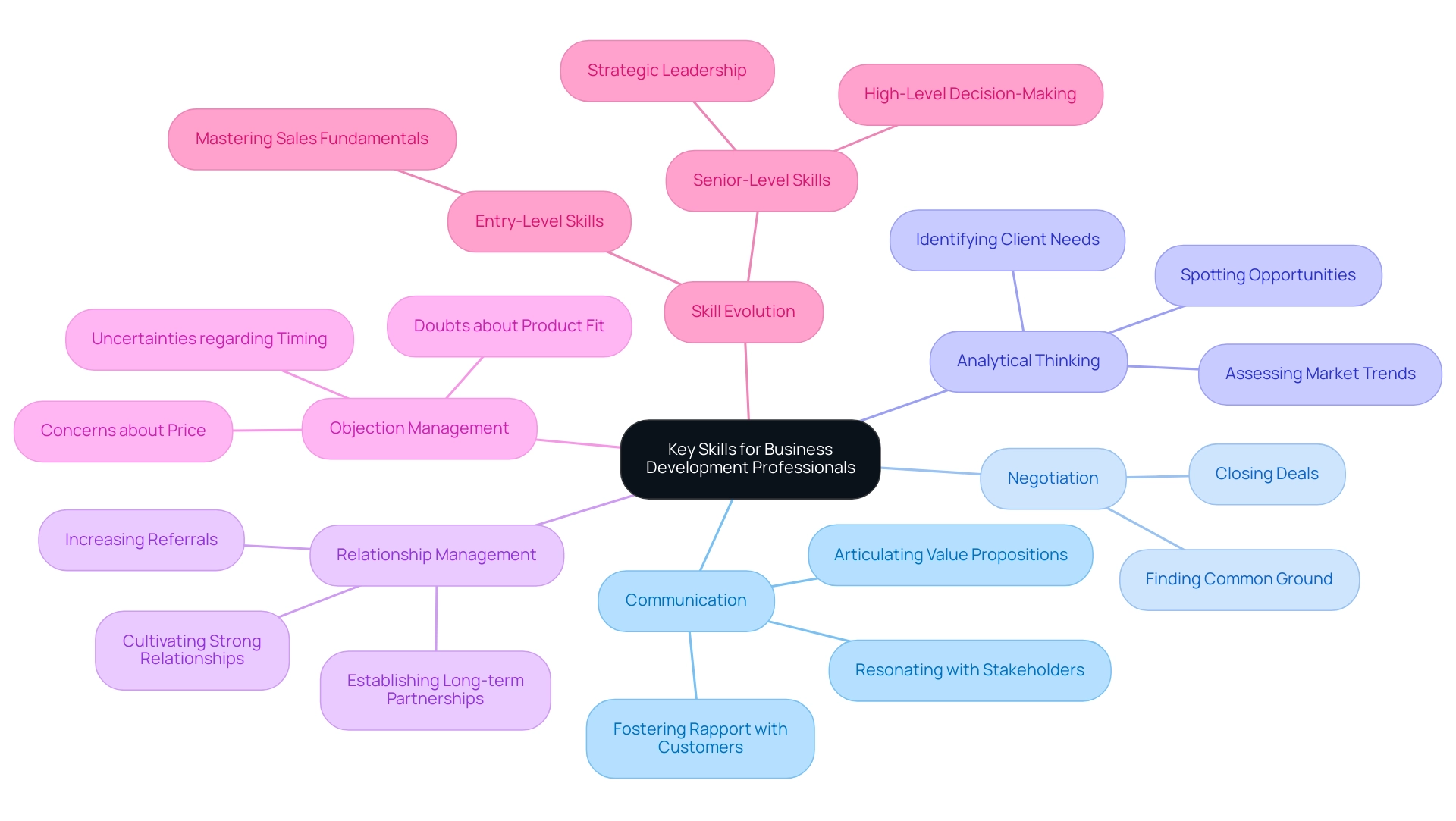
Strategic planning is essential for organizations aiming to establish clear objectives, identify target markets, and outline actionable steps toward achieving desired outcomes. A fundamental component of this process is the SWOT analysis, which assesses Strengths, Weaknesses, Opportunities, and Threats, enabling organizations to gain a comprehensive understanding of their market position. As highlighted by industry experts,
There is no better way to encourage that entrepreneurial thinking than watching one of the classic business movies to inspire you
— Sara Lynch.
Moreover, the creation of Key Performance Indicators (KPIs) is essential for assessing success and improving plans as needed. For example, a company looking to enhance its market share might set a goal to penetrate two new regions within a year. This objective would be supported by a robust action plan that encompasses market research, resource allocation, and systematic performance tracking.
In light of recent surveys, the active involvement of external experts in the strategic planning process has proven invaluable, providing an unbiased perspective that enhances decision-making. This corresponds with findings that highlight the significance of utilizing external insights for effective planning. Additionally, Rhythm Systems' double your-money-back guarantee on its software and services highlights a tangible example of success in strategic planning, reinforcing the value of structured approaches.
Effective leadership and clear organizational goals are paramount, particularly as businesses engage in business development and consulting to prepare for the challenges of 2024. The case study on Leadership and Strategic Planning Statistics underscores that effective communication and clear organizational goals are essential for strategy success, highlighting the need for business development and consulting support from strategic providers to navigate these complexities.
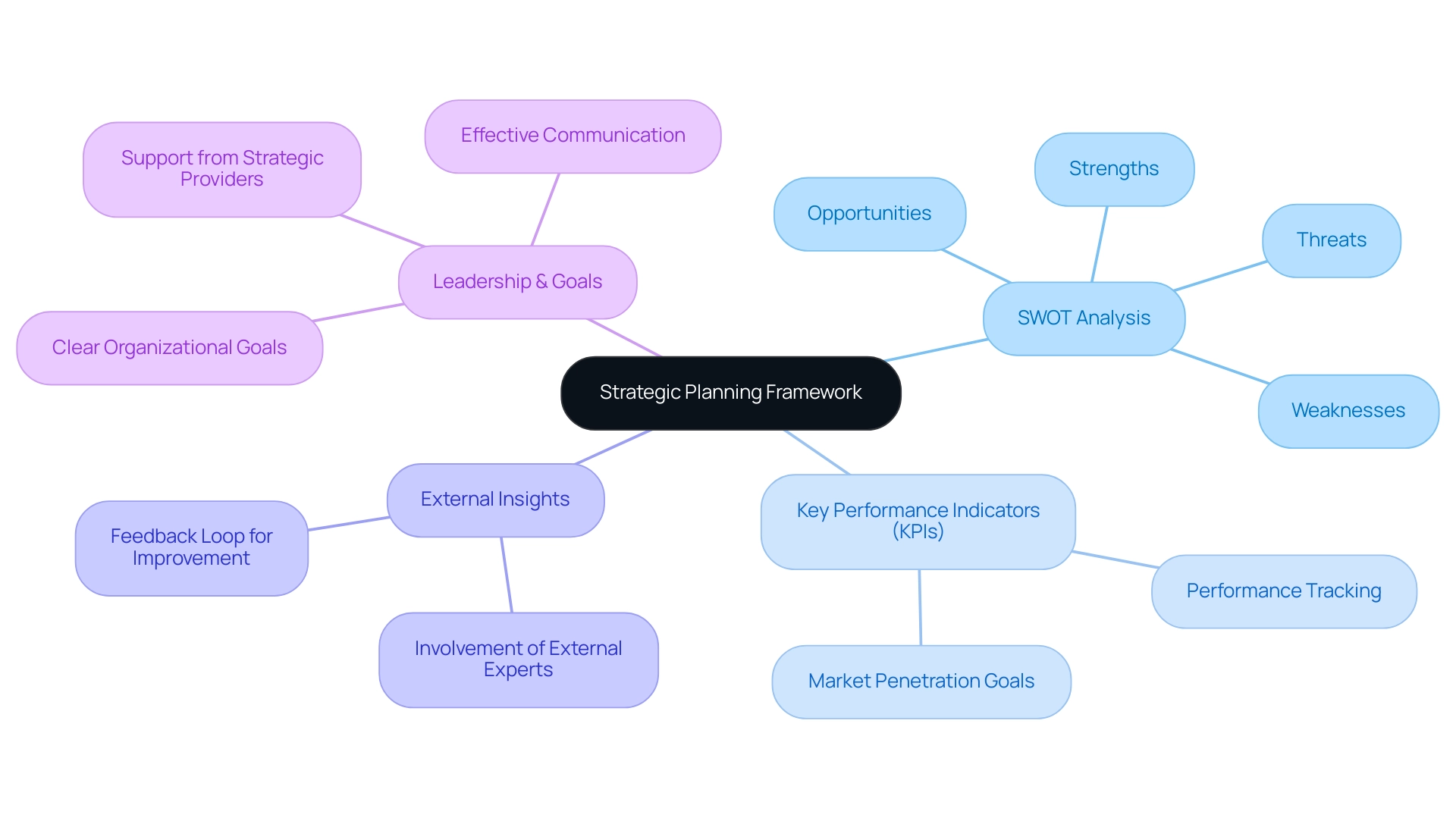
To drive significant enhancements in revenue performance, organizations are increasingly turning to advanced technology tools, particularly Customer Relationship Management (CRM) systems, data analytics, and automation solutions. These tools not only facilitate the tracking of client interactions but also enhance the management of relationships, ensuring that every touchpoint is meaningful. As emphasized by recent industry insights, despite widespread CRM adoption, a gap in awareness remains among professionals, indicating a crucial opportunity for further education and growth in this area.
Julie Abecassis, a customer success manager, emphasizes the importance of leveraging these tools to maximize their effectiveness in commerce. Furthermore, data analytics plays a pivotal role in deciphering customer behavior and identifying market trends, empowering teams to make informed decisions. For instance, integrating AI-powered communication tools can boost local call pickups by up to 500%, demonstrating the tangible benefits of these technologies.
Automation tools streamline repetitive tasks, enabling sales teams to allocate their time to high-value activities that yield better results. Companies utilizing leading CRM platforms, such as Salesforce, can personalize outreach based on detailed client histories and preferences, significantly enhancing engagement and conversion rates. As we move towards 2024, the integration of chatbots within CRM systems is projected to rise, with 80% of businesses planning adoption.
This trend indicates a clear shift toward more automated customer interactions and support, transforming the commercial landscape. Key insights from various sources illustrate current trends and future projections in the CRM sector, emphasizing the significance of embracing innovative approaches to stay competitive. To further improve your sales skills, explore our downloadable training packages that provide practical approaches and insights tailored to your needs, including offerings from Magical Selling and Pods Asia.
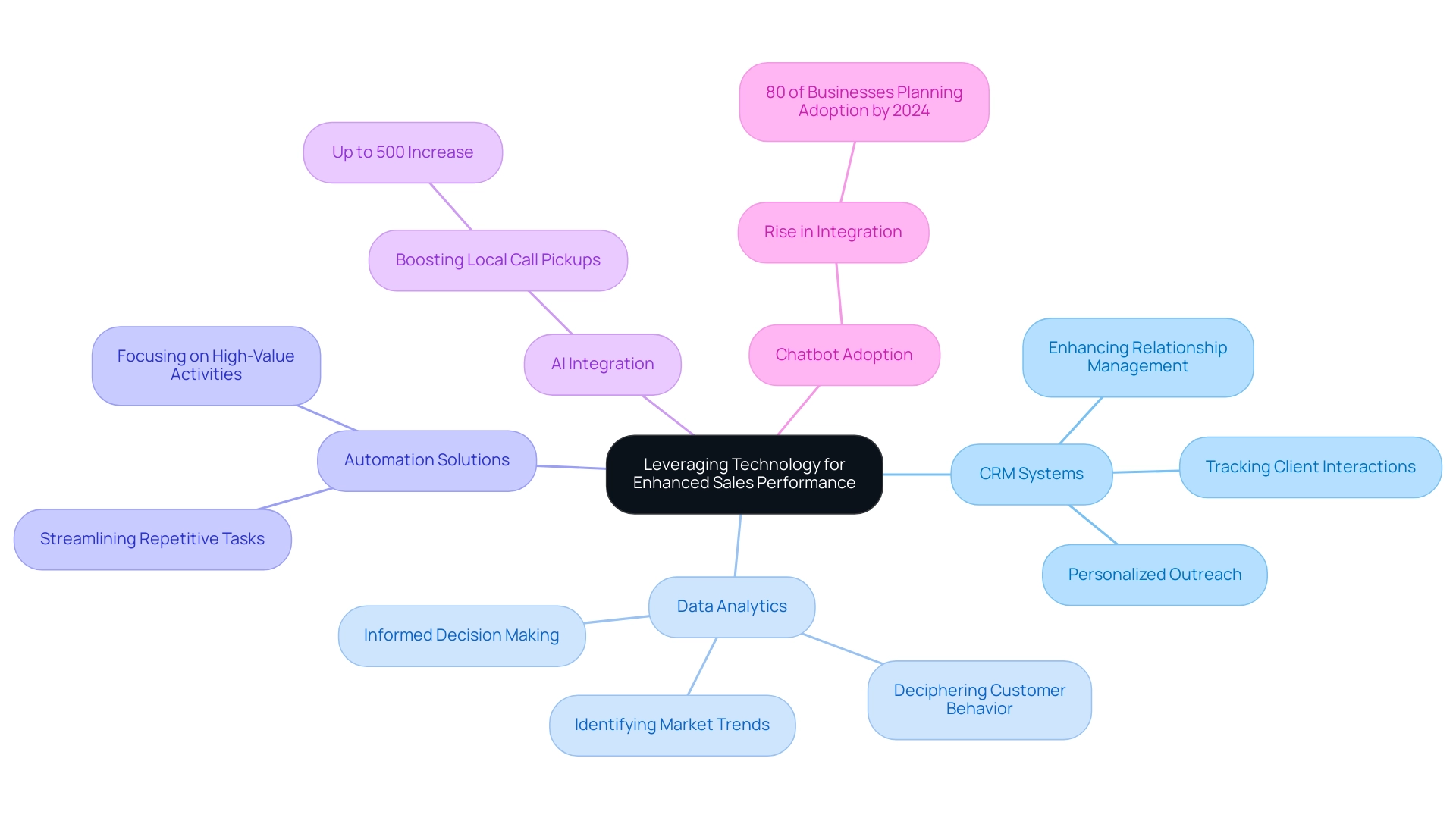
Investing in training and development programs is crucial for business development and consulting teams aiming to maintain a competitive edge. Recent findings indicate that training has emerged as the primary strategy for operators planning to reduce food costs in the next 12 to 18 months, with statistics showing that it was the top response among operators. Dana Farese emphasizes this, stating, "Across all segments and org sizes, training was the top response when respondents were asked how they plan to reduce food costs in the next 12-18 months."
This highlights the critical role of such initiatives in enhancing operational efficiency. Organizations should prioritize regular training sessions that focus on:
For example, the case study titled 'Sales Orientation Program for Deep Tech Startups' illustrates how targeted training resulted in acquiring 17 new clients in South East Asia within two quarters, highlighting the effectiveness of a structured method to commerce.
Additionally, the transformative 'Mission 50' strategy emphasizes streamlining vendor management by providing a single point of contact for multiple vendors, which can significantly enhance operational efficiency and business transformation. The Sales Bond Academy offers a comprehensive curriculum aimed at enhancing sales skills while fostering a culture of continuous learning. By providing teams with current knowledge and skills, organizations significantly improve their ability to effectively respond to customer needs and adapt to changing market demands.
This commitment to training not only enhances individual performance but also aids in the overall success of business development and consulting efforts in 2024 and beyond.
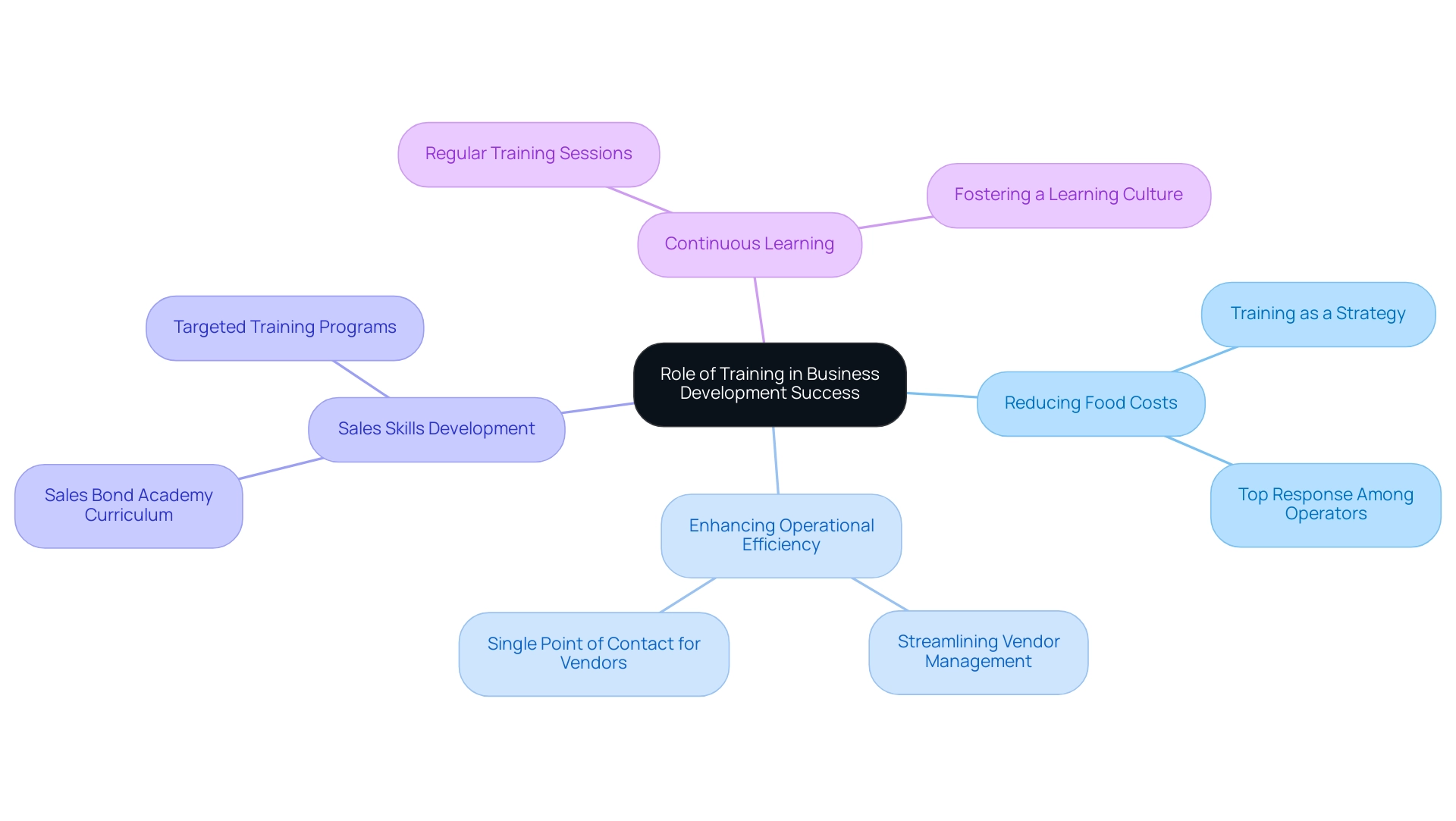
Professionals in business development and consulting encounter a myriad of challenges, including the complexities of managing client relationships, negotiating contracts, and responding to market fluctuations. Notably, the broader context highlights that women are paid about 22% less than men, underscoring the gender dynamics that can influence business interactions. To navigate these hurdles, effective communication and relationship-building skills are indispensable for successful business development and consulting.
For instance, segmenting accounts based on the appropriate sales approach can significantly enhance productivity and ultimately double your sales productivity. Implementing regular check-ins with clients fosters transparency and allows for the proactive addressing of concerns, ultimately strengthening those vital relationships. Furthermore, a notable 59% of individuals think that effective negotiation approaches should focus on win-win results, which not only improves contract discussions but also fosters trust and collaboration.
Moreover, as firms progressively emphasize profitability over superficial metrics, as demonstrated in the case study titled 'Focus on Profitability,' developers are tasked with aligning their approaches with revenue-driven KPIs. Understanding key market trends and demonstrating adaptability through flexible win plans are crucial for business development and consulting to capitalize on emerging opportunities. Detailed methods for account segmentation, such as customizing approaches based on customer requirements and market conditions, can further enable business development and consulting professionals to turn challenges into opportunities for growth, strengthening their role as strategic allies in their organizations.
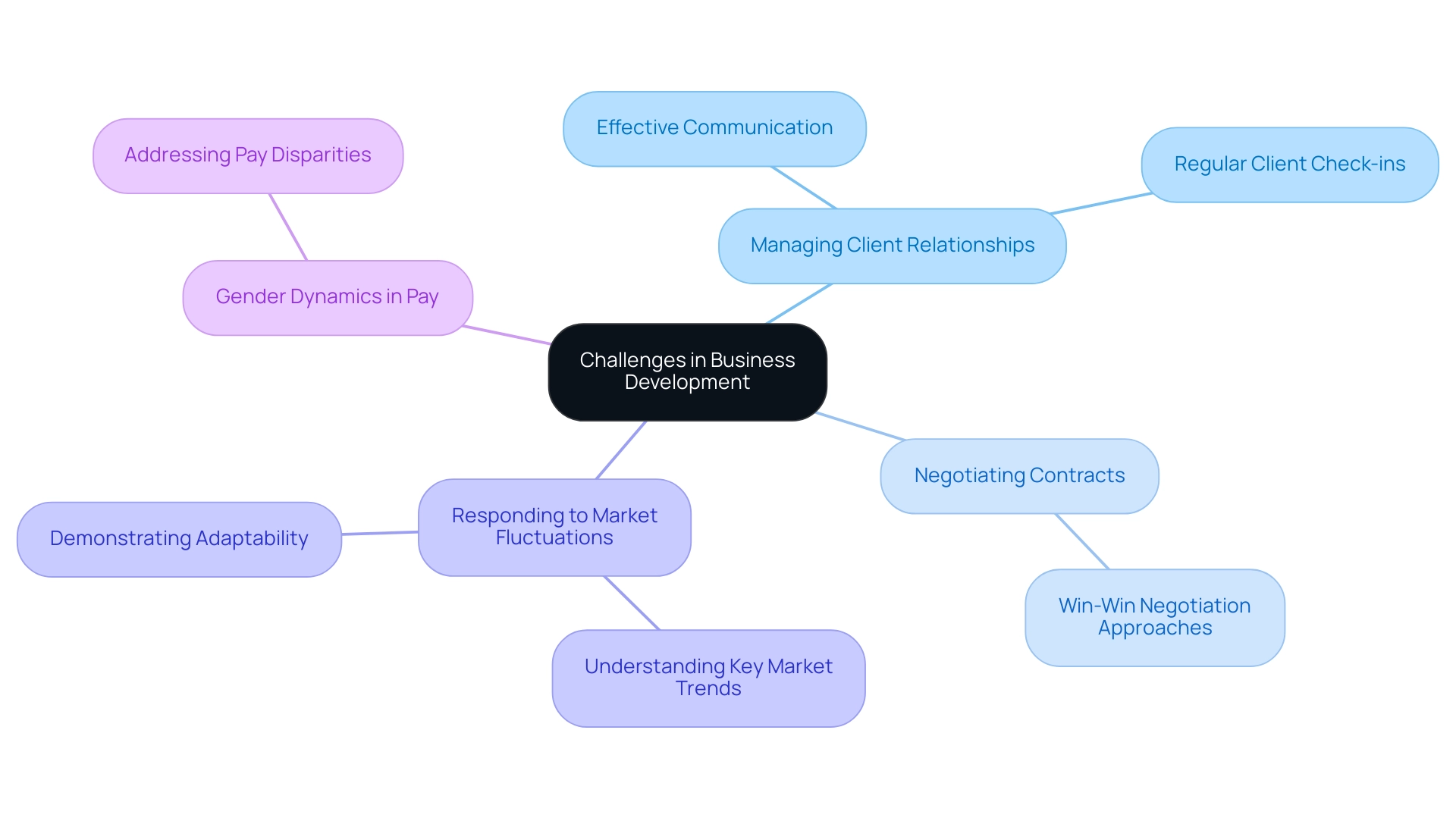
To thrive in the ever-evolving landscape of business development, organizations must cultivate a mindset centered on continuous improvement. This approach involves a consistent assessment of marketing methods, proactive gathering of client feedback, and thorough analysis of performance data to uncover areas ready for improvement. Mission 50 emphasizes streamlining vendor management and adopting cost reduction methods, such as optimizing vendor selection and consolidating service providers, which can significantly enhance sales transformation efforts.
Upskilling horizontally is essential for modern business development professionals to remain relevant in a competitive market. Agile methodologies play a crucial role in this process, enabling organizations to swiftly adjust their strategies based on market feedback. For instance, when a company identifies customer concerns regarding a specific product feature, it can quickly modify its marketing tactics or refine product development efforts to better meet customer expectations.
A noteworthy example can be seen in a consulting firm's journey, which reported a 40% increase in customer retention after revamping its onboarding process, illustrating the value of effective sales skills training. Furthermore, Pods Asia's transformative Sales-as-a-Service solutions have successfully facilitated rapid customer acquisition and go-to-market expansion in sectors like hospitality, where a recent case study highlighted the acquisition of 17 new logos in just two quarters. This showcases how tailored training for account managers can yield significant results.
Furthermore, a recent initiative at a hospital, which implemented a real-time dashboard to track patient wait times, resulted in a 30% reduction in wait times and improved patient satisfaction, exemplifying continuous improvement in action. Greg Kihlstrom, a former member of the Forbes Councils, emphasizes that fostering an environment where feedback is valued and acted upon sets the groundwork for sustained organizational growth and improvement. By embedding a continuous improvement ethos into their operations, organizations not only enhance their adaptability but also ensure long-lasting client satisfaction and engagement in business development and consulting.
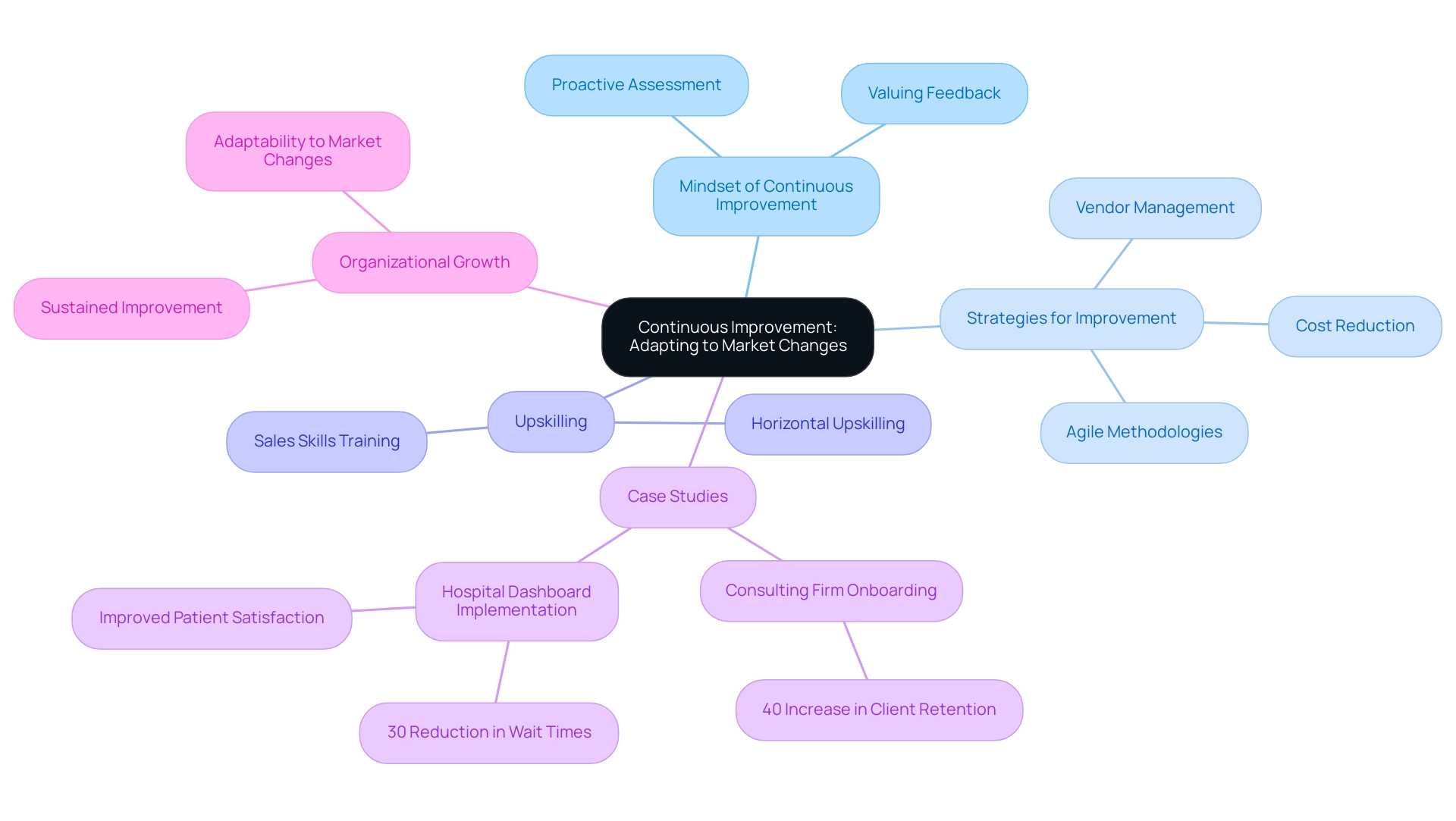
In the fast-paced arena of business development, organizations must embrace a multifaceted approach that integrates strategic planning, effective communication, and the use of technology to foster growth and navigate challenges. Key skills such as negotiation, analytical thinking, and relationship management are essential for professionals in this field. These competencies enable them to identify opportunities, build lasting partnerships, and implement strategies that drive sustainable success.
The role of consulting cannot be overstated, as it provides the expertise necessary to enhance performance and address complex market dynamics. By leveraging tools like CRM systems and data analytics, businesses can optimize their sales processes and improve client interactions, leading to increased engagement and higher conversion rates. Continuous training and development are pivotal in equipping teams with the latest industry knowledge and skills, ensuring they remain competitive in an ever-evolving landscape.
Ultimately, success in business development is rooted in a commitment to continuous improvement and adaptability. Organizations that prioritize strategic planning, foster a culture of learning, and remain responsive to market changes will not only thrive but also secure a competitive advantage in the challenging environments of APAC and ME. By embracing these principles, businesses can navigate obstacles effectively, turning challenges into opportunities for growth and innovation.
What is the purpose of business development and consulting?
Business development and consulting aim to promote growth opportunities within an organization through market research, relationship management, and strategic partnerships that drive expansion.
How do consulting services enhance business development?
Consulting services provide expert insights that help organizations improve performance and address complex challenges, which are essential for effective business development.
What are some strategies used in business development?
Strategies include altering go-to-market approaches, implementing Service-as-a-Service solutions, and conducting discovery workshops to identify challenges and develop tailored strategies.
What role do discovery workshops play in business development?
Discovery workshops help unlock revenue potential by identifying unique challenges faced by teams, analyzing sales processes, and providing actionable insights to enhance performance.
Why is understanding industry trends important in business development?
Understanding industry trends, particularly in evolving sectors like hospitality and construction, is vital for sustained growth and maintaining a competitive advantage.
What challenges do startups in the APAC/ME regions face that consulting can help address?
Startups in these regions often face challenges such as time to value and market intelligence, which can be addressed through informed consulting guidance.
What skills are essential for successful business development professionals?
Essential skills include strong communication, negotiation, analytical thinking, and relationship management, which are crucial for navigating modern business landscapes.
How does mastering CRM systems benefit business development professionals?
Mastering CRM systems enhances professionals' capabilities by allowing them to leverage data-driven insights in their strategies, improving customer interactions and support.
What are the three main types of objections in the selling process?
The three main types of objections are concerns about price, doubts about product fit, and uncertainties regarding timing.
How can business development managers transition to other roles?
The versatile skills of business development managers allow for transitions into management, marketing, and consulting roles, making them valuable assets in growth-driven sectors.
What is the importance of continuous skill development for business development managers?
Continuous skill development is essential as each career stage requires a refined set of competencies to effectively navigate the complexities of the commercial environment.
What perspective does Daniel Raymond offer on success in business development?
Daniel Raymond emphasizes the importance of commitment to excellence and empowering teams to achieve their goals as key elements of success in business development.